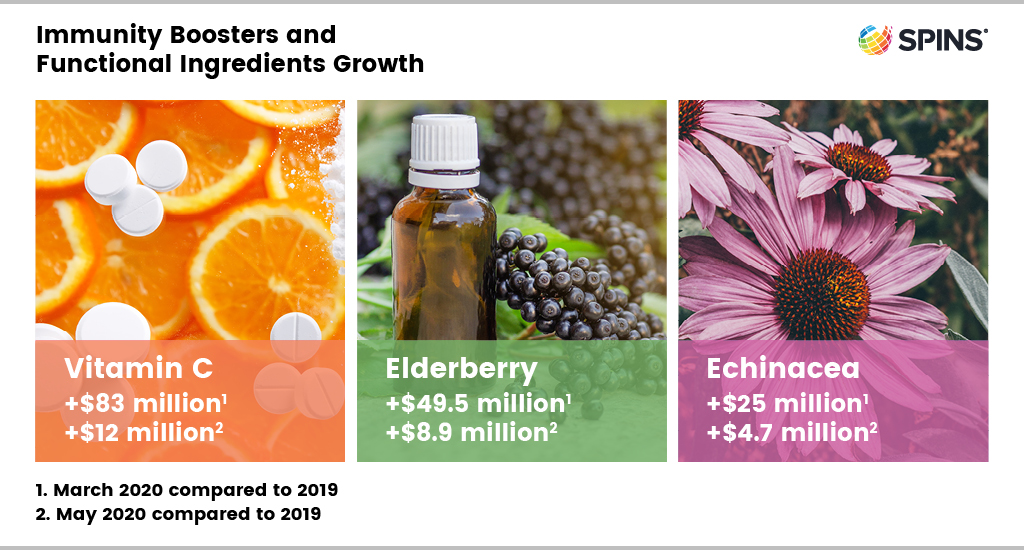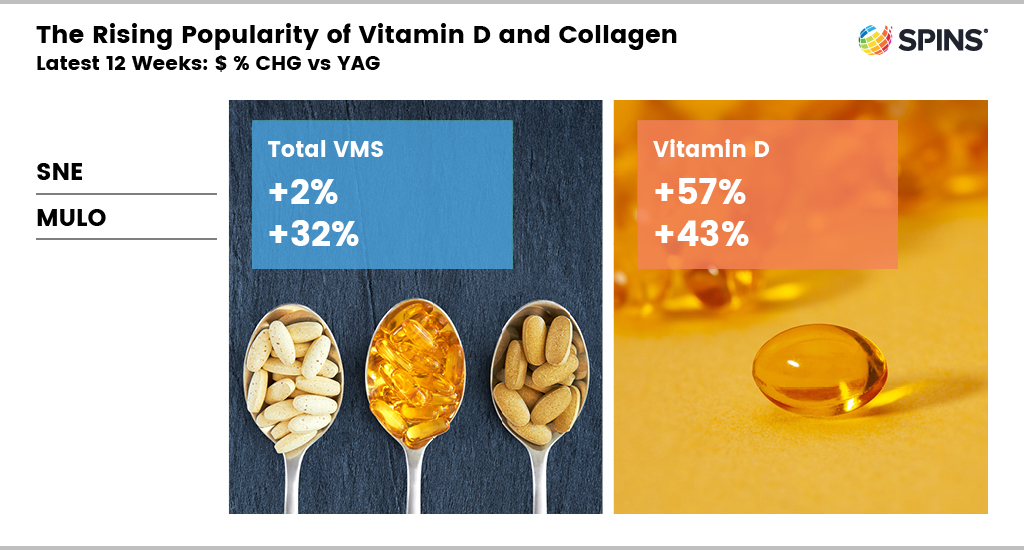Introduction
Supplements sales were on the rise even before COVID shook up consumer habits earlier this year. Dating back to 2018, supplements saw year over year growth. Vitamins and supplements sold a combined $4.75 billion in 2018, $5 billion last year, and are on target for $5.5 billion this year. As we mentioned in the earlier months of stay-at-home orders, customers began viewing food as medicine and adding supplements to their shopping trips, leading to a Q1 and Q2 boost. Because the Department of Homeland Security deemed supplements as essential, production never waned as demand rose. Now, months later, sustained sales figures are proving that shoppers have made supplements and functional ingredients mainstays in their diets.
Immunity Boosters and Functional Ingredients
Because dietary supplements are classified as products that contain a dietary ingredient, which can include vitamins, minerals, amino acids, herbs, or botanicals—and can include herbal supplements—consumers have several ways to incorporate them into their routines.
Like most grocery items, supplements experienced a sales spike in March, and although the figures have decreased since, they are still trending much higher than the same period last year. Vitamin C, elderberry, and echinacea, 3 of the bestselling supplements, are all touted for their immune-boosting benefits. March sales were staggering for the 3 supplements: Vitamin C with $83 million, elderberry with $49.5 million, and echinacea with $25 million. Through May Vitamin C was still bringing in $12 million, elderberry $8.9 million, and echinacea $4.7 million.

What Are the Most Popular Functional Ingredients?
Today’s shoppers are looking throughout the grocery store to find dietary benefits where they can get them—and not just for immunity. Functional ingredients have become a draw for many consumers who want to retain their current dietary preferences but get an added benefit from it. For example, a shopper reaching for a bottle of tea might opt to grab green tea for a change since it still satisfies their craving but comes with the benefit of antioxidants.
Among the most popular functional ingredients are:
- Vitamin D products, which focus on bone health
- Collagen for aiding hair, skin, and nails strengthening and growth
- Melatonin, which is most commonly found in sleep aids
- Phosphatidyl Serine, once lesser-known but now a popular cognitive health ingredient
- Chinese Herbs, zinc, and mushrooms, which are gaining popularity for immunity
The Rising Popularity of Vitamin D and Collagen
Vitamin D has become one of the more popular ingredients as its many health benefits are especially attractive in the midst of the pandemic. Although there is no proven link between Vitamin D and preventing or reducing the severity of COVID-19, there has been speculation and researchers are still looking for conclusive evidence. Those ongoing debates combined with the fact that people most commonly deficient in Vitamin D are also the ones disproportionately affected by COVID-19 help explain its growing popularity.

Looking at the last 12 weeks of data compared to 2019, vitamins, minerals, and supplements have grown 2% in natural outlets and 32% in conventional retailers. In comparison, Vitamin D has grown 57% in natural outlets and 43% in conventional. By percentage of dollar growth, gummy chews are the fastest-growing Vitamin D format, with 72% growth in the same time period, followed by tablets at 49% and soft gels at 36%.
Similarly, collagen is outpacing overall vitamins, minerals, and supplements sales in conventional retailers with 62% vs 32%. Collagen offers benefits for skins, tendons, ligaments, and more, earning an association with a youthful appearance and lifestyle. As collagen grows in popularity, retailers should watch as consumers decide which format and types work best for their lifestyles. Available in pills, powders, and liquids (as well as included as a functional ingredient in products), and from marine and bovine sources, collagen offers shoppers a lot to choose from.
Shoppers will continue to implement vitamins, supplements, and other functional ingredients into their daily diets, especially with health concerns being a concern for the foreseeable future. If you’re interested in seeing how SPINS can help you watch and adapt to these trends, contact us today.





